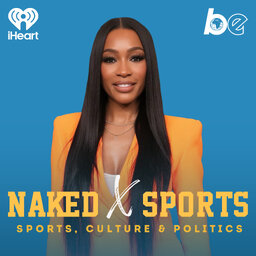POPS with Craig Melvin
Craig Melvin is an award-winning news anchor on NBC News’ “TODAY,” a co-host of 3rd Hour TODAY, an anchor on MSNBC Live, and a host of “Dateline.” His breaking news coverage and reporting appear across all NBC News and MSNBC platforms. Melvin walks us step by step on the road to getting, “the dream job…the gig” that he has now and the important lessons he learned from his Pops that helped shaped the man he has become.
Learn More: Pops: Learning To Be A Son And A Father
Connect: @CariChampion @CraigMelvin
In 1 playlist(s)
Naked Sports with Cari Champion
NAKED SPORTS lives at the intersection of sports, politics, and culture. It is a niche groundbreakin…Social links
Follow podcast
Recent clips

Hot Topics: January
49:44

DAVID E. SANGER: What's Next After Venezuela?
33:32

REPLAY - Izzy Harrison: More Than the Game
1:00:53
 Naked Sports with Cari Champion
Naked Sports with Cari Champion